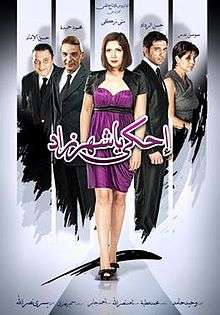Scheherazade, Tell Me a Story
Scheherazade, Tell Me a Story (Arabic: إحكي يا شهرزاد, translit. Ehki ya shahrazade) is a 2009 Egyptian film. The film Was Showing on 60 cinemas on Egypt at last of June 2009
| Scheherazade, Tell Me a Story | |
|---|---|
 | |
| Directed by | Yousry Nasrallah |
| Produced by | Misr Cinema Company |
| Screenplay by | Yousry Nasrallah |
| Starring | Sawsan Badr Mahmoud Hemeda Rehab El Gamal Hassan El Raddad Mona Zaki |
| Music by | Tamer Karawan |
| Cinematography | Samir Bahsan |
| Edited by | Mona Rabi |
Release date | 24 June 2009 |
Running time | 135 minutes |
| Country | Egypt |
| Language | Arabic |
| Box office | 12,200,000 |
Synopsis
In modern Cairo, Hebba hosts an evening political talk show on Sun TV. Karim, her husband, is the deputy director of a newspaper that backs the Government; he dreams of soon being the director. However, it is made clear to him that his wife's political opinion's, that lean towards the opposition, are poorly received and could cost him his promotion. Using his charm and sex as tools, he convinces Hebba to choose social themes that will not affect the Government.
Unbeknownst to Karim, the collection of female stories Hebba decides to broadcast coincidentally prove political in nature. Tension between the two ensues and reveals the corruption of Karim's male-dominated world as Hebba becomes increasingly sympathetic to women very different from her.
Themes
The most notable theme in the film is female support and community. As Hebba is able to reach out to more women to be interviewed on her show, Hebba develops a connection with the female community. Hebba ends the movie surrounded by women, and ready to stand up for herself against her husband's abuse. There is also the theme of globalization and its effects as seen in scenes, such as the one where Hebba and Karim are having lunch and are constantly distracted by the loud horn of the cruise ship behind them. In addition, we see glimpses of the female-on-female gaze. As Hebba is on the train with Selma, she receives many critical stares from the women in traditional dress. Hebba eventually feels so uncomfortable and takes the scarf she is offered to cover herself. Similarly, Karim experiences the male-on-male gaze. He is often seen flattering other men, who are his seniors as he wants to be the next editor-in-chief. He feels the pressure of his colleagues expecting him to attain this promotion. However, when he is told he did not receive it, his embarrassment becomes rage and leads to his abuse of Hebba.
Other worthy themes for analysis include the breakdown of the patriarchal bargain in Egyptian society. Throughout the many stories within the film, gendered expectations are placed upon the women while men only draw benefits and offer no support or protection as expected in the social contract of the patriarchal bargain[1]. This loss of traditional values that would usually make the construct of marriage beneficial for both parties, diminishes marriage into an exploitative tool for men to control their wives. This loss of support for only exploitation can be understood as a commentary on the modern Egyptian government in which patriarchal protection typically expected from government is no longer provided and instead only operates to control and capitalize on its citizens.
Another notable theme, is the challenge for women standing at the crossroads of tradition and modernity[2]. One of these challenges described above is the devaluation of marriage in modern society along with establishment of female presence in the political world. Echoes of these ideas of tradition are emphasized by the trope this film aims to mimic, One Thousand and One Nights in which Scheherazade must tell series of stories to win the trust of a man sparing her life. This traditional narrative form still proves effective in modern society and similarly wins Hebba the trust of her husband for some time.
Criticism
The director, Yousry Nasrallah fails in the respect that while he offers a platform discussing women's issues rooted in patriarchal oppression, he does so through the lens of a male gaze. As a male director, Nashrallah naturally resorts to a male gaze which at times works against the very motive of the film. Often focusing camera angles and lingering shots on female characters’ curves and feminine features, the director perpetuates patterns of female objectification to favor a familiar mainstream style. This directly undermines many of the themes the film aims to discuss such as the male-on-male gaze in Karim's workplace and the female-on-female gaze. These themes discussed earlier acknowledge the flexibility of seeing and the complexity of participants within these gazes, however the director's use of the male gaze to present the film reestablishes the gendered roles of looking and pleasure to be active/male and passive/female.[3]
Awards
- Venice Festival 2009
- Festival de los Tres Continentes (Nantes), Francia 2009
References
- Hossain, Naomi (2017-02-23), "The Breaking of the Patriarchal Bargain and the Emergence of the 'Woman Issue'", The Aid Lab, Oxford University Press, pp. 75–90, doi:10.1093/acprof:oso/9780198785507.003.0004, ISBN 978-0-19-878550-7
- Orlando, Valérie K. (2014-07-24). "Scheherazade Tell Me A Story(Yousry Nasrallah, 2009): Talking Women's Rights, Feminism and the 'Arab Spring'". Quarterly Review of Film and Video. 31 (7): 679–691. doi:10.1080/10509208.2012.710521. ISSN 1050-9208.
- Mulvey, Laura (1991), "Visual Pleasure and Narrative Cinema", Feminisms, Macmillan Education UK, pp. 432–442, doi:10.1007/978-1-349-22098-4_25, ISBN 978-0-333-57936-7